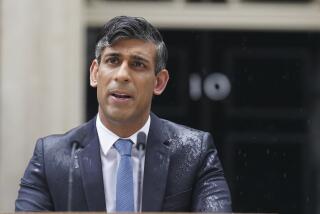Scotland to vote on independence in September 2014
LONDON – Voters in Scotland will head to the polls in September 2014 to decide whether to go it alone as an independent country or remain in Great Britain with England and Wales.
The referendum could lead to the biggest political shakeup in the British Isles since Ireland achieved independence nearly a century ago.
Alex Salmond, Scotland’s first minister, unveiled the date of the milestone vote Thursday in the Scottish Parliament in Edinburgh. The plebiscite is the sine qua non of his Scottish National Party, or SNP, which swept to power in an election two years ago.
“I’m honored to announce that on Thursday, the 18th of September, 2014, we will hold Scotland’s referendum, a historic day when the people will decide Scotland’s future,” Salmond said to applause from fellow SNP lawmakers. “That day … is the day we take responsibility for our country, when we’re able to speak with our own voice, choose our own direction and contribute in our own distinct way.”
The date requires ratification by the Parliament, but since Salmond’s party controls the body, such approval is a formality.
The referendum will ask: “Should Scotland be an independent country?” A victory for the “yes” side would dissolve a sometimes happy, sometimes rocky political marriage sealed in 1707.
Salmond, considered by some to be the savviest politician in Britain, said that “two futures” for Scotland would be on offer.
“A ‘no’ vote means a future of governments we didn’t vote for, imposing cuts and policies we don’t support,” he told legislators. “A ‘yes’ vote means a future where we can be certain, 100% certain, that the people of Scotland will get the government they vote for.”
But he has his work cut out for him. Virtually no credible poll has ever shown a majority of Scots to favor independence – greater autonomy, perhaps, but not outright secession from Britain.
Salmond was needled by Johann Lamont, the leader of the Scottish Labor Party, who asked why, if independence was so important, his party did not push for an earlier date.
“The truth is, Alex Salmond knows if he held the referendum now, he wouldn’t just lose it. He would be routed,” said Lamont, who added that Scotland would remain “on pause” until the vote, with important issues going unaddressed in the interim.
The exact date of the referendum has been the subject of a political guessing game for months, since Salmond and British Prime Minister David Cameron agreed in October that the vote should go ahead. Cameron and his Conservative Party have vowed to fight to keep Scotland in union with England and Wales, as has Britain’s opposition Labor Party.
Cameron had demanded an earlier vote but relented on 2014 as the year, which marks the 700th anniversary of the Battle of Bannockburn, an iconic event in Scotland’s wars of independence against the English. He also signed off on permitting 16- and 17-year-olds to vote in the plebiscite.
But Salmond compromised as well, acceding to a simple up-or-down vote on independence rather than a referendum that also offered an alternative choice of increased autonomy.
Supporters of independence insist that Scotland and its 5.2 million people would be better off unyoked from their neighbors to the south, free to pursue their preferred version of social democracy and to use revenues from North Sea oil how they see fit.
Unionists dispute Scotland’s claim on the oil and say that Scotland already enjoys wide latitude in policy making. They also questioned how the newly independent nation would continue using the British pound, as Salmond says it would, given that the pound would essentially be a foreign currency regulated by a foreign body, the Bank of England.
ALSO:
Jailed Kurdish leader calls for truce with Turkey
Obama says Palestinian state still a viable option
Death sentence upheld in 1993 Indian bombing that killed 257
More to Read
Sign up for Essential California
The most important California stories and recommendations in your inbox every morning.
You may occasionally receive promotional content from the Los Angeles Times.











